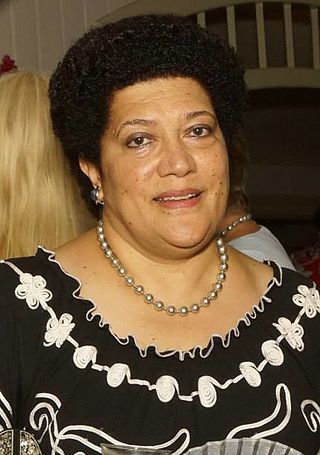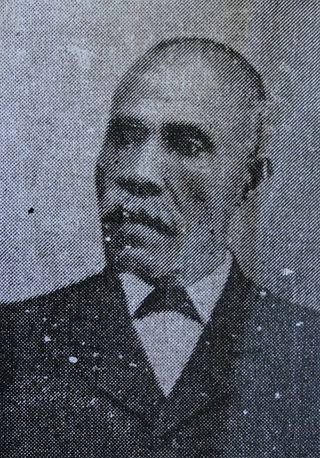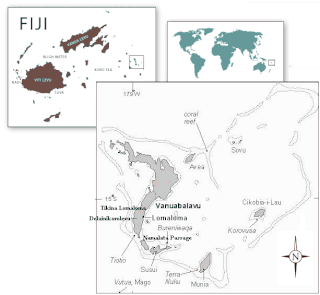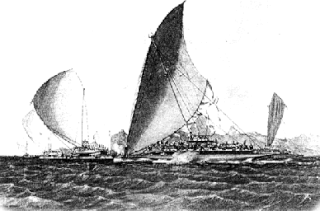
Ratu Epeli Nailatikau I (c. 1842 - 1901) was a Fijian Paramount Chief, who was posthumously made the Vunivalu of Bau.

Ratu Epeli Nailatikau I (c. 1842 - 1901) was a Fijian Paramount Chief, who was posthumously made the Vunivalu of Bau.
He was the eldest son of the first Tui Viti , Ratu Seru Epenisa Cakobau and his first wife, Adi Litia Samanunu, daughter of the Roko Tui Bau . [1]
He acted as his father's right-hand man in the Bauan struggles for power, and was subsequently made a governor of many of the Fijian states, (including being made the Roko Tui Tailevu) and a minister in various early portfolios. He was also a signatory to the 1874 Deed of Cession to Great Britain (see Fiji's Cession to Great Britain).
Ratu Epeli's eldest son, Ratu Penaia Kadavulevu inherited the title of Vunivalu, while his second daughter, Adi Moce was the wife of Ratu Alifereti Finau Ulugalala and the grandmother of Fiji's Founding Father, Ratu Sir Kamisese Mara.

Adi Koila Mara Nailatikau is a Fijian lawyer, who has served as a diplomat and politician. She was also First Lady of Fiji from 2009 until 2015, as the wife of Ratu Epeli Nailatikau, the President of Fiji.

RatuSeru Epenisa Cakobau was a Fijian chief, monarch, and warlord (Vunivalu) who united part of Fiji's warring tribes under his leadership, establishing a united Fijian kingdom. He was born on Natauloa, Nairai Island in Lomaiviti but spent his youth on Vanuaso, Gau, Lomaiviti, later returning to Bau to re-establish his Father's Ratu Tanoa Visawaqa reign. Ratu Epenisa Seru Visawaqa was given the name "Cakobau" meaning destroyer of Bau, in reference to his grandfathers' (Nailatikau) effort to first claim the tile from the people of Butoni and Lovoni, returned with most of his warriors from Vanuaso, Gau, Lomaiviti to coup the leadership in Bau then and later takeover his father's title; known after his father as the 6th "Vunivalu" or Warlord of Bau.

RoLala, Lady Mara, maiden name Litia Cakobau Lalabalavu Katoafutoga Tuisawau was a Fijian chief, who was better known as the widow of Ratu Sir Kamisese Mara, modern Fiji's founding father who served for many years as Prime Minister and President of his country. As Fiji's First Lady, Adi Lala took on a diplomatic role, frequently representing her country abroad. She was regarded as a formidable and astute woman, whose influence on her husband was said to be considerable.
Ratu is an Austronesian title used by male Fijians of chiefly rank. An equivalent title, adi, is used by females of chiefly rank. In the Malay language, the title ratu is also the traditional honorific title to refer to the ruling king or queen in Javanese culture. Thus in Java, a royal palace is called "keraton", constructed from the circumfix ke- -an and Ratu, to describe the residence of the ratu.

RatuJoni Madraiwiwi was a Fijian Ratu and early colonial administrator in what was then the British Crown Colony of Fiji.

Kubuna is one of the three confederacies that make up Fiji's House of Chiefs, to which all of Fiji's chiefs belong.

Turaga na Vunivalu na Tui Kaba, shortened as Vunivalu, is the Paramount Chief of the Kubuna Confederacy of the island of Bau in Fiji. Loosely translated the title means Warlord of Bau or "Root of War". The succession to the title does not follow primogeniture, but the candidate must be a high-ranking member of the Tui Kaba clan.

Bau is a small island in Fiji, off the east coast of the main island of Viti Levu. Bau rose to prominence in the mid-1800s and became Fiji's dominant power; until its cession to Britain, it has maintained its influence in politics and leadership right through to modern Fiji. Due to its sacred nature, foreigners have to apply for a permit to visit.
RatuAlifereti Finau was the eleventh Sau ni Vanua of Lau and the fifth Tui Nayau. He was a member of the noble household Matailakeba.
AdiLitiana Maopa (1864-1933) was a prominent member of two of Fiji's main chiefly houses, those of the Tui Nayau, the paramount chief of the Lau Islands, and the chiefly house of the Vunivalu of Bau the paramount chief of the Kubuna Confederacy.

RatuTanoa Visawaqa was a Fijian Chieftain who held the title 5th Vunivalu of Bau. With Adi Savusavu, one of his nine wives, he was the father of Ratu Seru Epenisa Cakobau, who succeeded in unifying Fiji with the help from British missionaries and the crown into forming the contemporary Fiji today.

RatuPopi Epeli Cakobau was a Fijian chief and politician. He held the title of Vunivalu of Bau from 1914 until his death in 1936, and was also a nominated member of the Legislative Council.

Turaga na Rasau is a traditional Fijian chiefly title of the Lau Islands. Prior to Fiji's colonial days, Fiji had many different Vanua with their own Paramount Chieftain which exercised no authority over the other; a saying from the island of Kadavu aptly summarises it "Nomu Turaga o sega na noqu Turaga" or "Your Chief is not my Chief" also the people of Beqa Island were of a similar opinion saying "Qali Cuva Ki Lagi" or "Subject only to heaven" and would bow to no outside Chieftain, but at the turn of the 20th century aspects of the traditional social structure remained, but for administrative purposes three main Matanitu were solidified and formed as they were the dominant consolidated powers at the time being that of Kubuna, Burebasaga and Tovata. With regard to the Rasau while its traditional origins were in Kubuna on Bau the titles traditional authority in modern Fiji is now in Tovata, Lau in particular Lomaloma Tikina on the Island of Vanua Balavu.

The Lasakau Sea Warriors were a 19th-century warrior sub-culture in the pre-colonial state of Bau, in Fiji. The sea warriors were instrumental in spreading Bau's political power throughout the South Pacific archipelagic islands. The rise of the eminent islet of Bau amongst other embryonic states was due mainly to the projection of sea power through its naval forces. Bauan chief Ratu Loaloadravu Tubuanakoro was praised by French Captain Dumont D'Urville in May 1827 for his geographic knowledge of the Fijian archipelago signifying Bau's naval influence. More far-ranging than Bau's land warriors led by the Vusaradave clan, the Lasakau clan became the leading proponents of war and tribute for the emerging island kingdom. They became known as the Bai kei Bau or 'War fence of Bau'. Sahlins made the crucial observation that," The kings of Bau based their rule not on native cultivators but on native sailors and fishers-which is to say in Fijian categories, as in political strategies, not on the land but on the sea". This was the great political transformation that catapulted Bau to power over other pre-colonial kingdoms.
Kapaiwai Tuimacilai Mara, chiefly seafarer, and descendant of the Vunivalu of Bau.
Bau is the main village on Bau Island, Fiji. Once integral to the power and economy of the chiefly village, the villages of Lasakau and Soso are also located on the twenty-two acre island which became the centre of traditional power throughout the Fiji Islands in the nineteenth century.
RatuJione Atonio Rabici "Tom" Doviverata was a Bau chief and medical doctor and administrator in colonial Fiji.
In Fiji, Turaga na Roko Tui Bau is a vassal chief of the Vunivalu of Bau. From his seat at the residence of Naicobocobo, the Roko Tui Bau rules the Vusaratu chiefs and has relationships with the Roko Tui Dreketi, Ratu Mai Verata, Roko Tui Namata, Roko Tui Veikau, Tui Vuya and other members of Fiji's House of Chiefs.

RatuJosefa Celua was a Fijian chief from the island of Bau. He was the youngest son of Ratu Seru Epenisa Cakobau, King of Fiji, 6th Vunivalu of Bau, King of Bau, and his first wife, Adi Litia Samanunu, daughter of the Roko Tui Bau. In reporting official occasions he was referred to by Australian newspapers as Prince Joseph Celua of Fiji.
![]() Media related to Epeli Nailatikau I at Wikimedia Commons
Media related to Epeli Nailatikau I at Wikimedia Commons